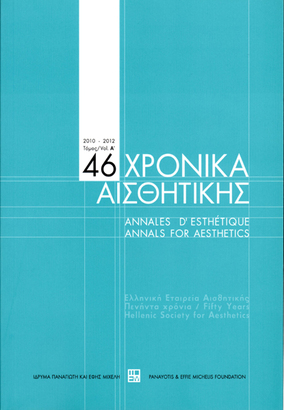Ανδρέας Κάλβος : η εμπειριοκρατική προσέγγιση της αισθητικής προβληματικής
Part of : Χρονικά αισθητικής : ετήσιον δελτίον της Ελληνικής Εταιρείας Αισθητικής ; Vol.46, No.Α, 2010, pages 287-296
Issue:
Pages:
287-296
Parallel Title:
Andreas Kalvos : the empiricist approach to aesthetics
Section Title:
Αισθητική - Φιλοσοφία της Τέχνης - Ιστορία της Τέχνης Aesthetics/Philosophy of Art - History of Art
Author:
Abstract:
Andreas Kalvos, the famous Greek poet of the Odes, delivered a series of philosophy lectures on issues of psychology, aesthetics and ethics at the Ionian Academy in Corfu, in the years 1840-1841. His original manuscript of these lectures has been lost. Nevertheless, we know now the content of them thanks to Panages D. Aliprantes, who discovered and edited the notebooks of one of Kalvos’s students. Considering Kalvos’s lectures on aesthetics, we can characterise his approach as aesthetic empiricism. According to him, the primary pleasure in the service of human survival is transformed into the mental desire of knowing and appreciating the beauty of nature and of the arts. Kalvos points out that their difference is not a distinction between equal aspects, but it is a true difference of levels. Absolute beauty does not exist. Since natural beauty and moral beauty are connected, they can be recognised in both natural objects and in intelligible ones. So, natural objects bear also the traces of moral beauty, since they are works of God and God includes also moral beauty. Considering the sublime, he distinguishes between objects that are eminent and sublime, and the intelligible object that is eminent, sublime and majestic. Natural objects are sublime because of their size, such as the mountains of Switzerland; God is sublime because God is the most eminent and majestic “object” beyond size. The subjective aspect of the sublime concerns the feeling of piety, inspiration, magnanimity, freedom, virtue and admiration. Kalvos considers colour, size and motion as the main elements of beauty in art. Art imitates nature and, at the same time, follows reason, especially the principle of symmetry. Kalvos is sceptical about the possibility of knowing beauty in itself. But, he does not deny that we can achieve knowledge of the forms of beauty and understand works of art. So, his aesthetic empiricism does not become extreme scepticism or relativism and includes some intimation of Platonism and Kantianism.
Subject:
Subject (LC):
Keywords:
ποίηση, Ελλάς, ηθική
Notes:
Το κείμενο βασίστηκε σε διάλεξή του συγγραφέα, στο πλαίσιο προγράμματος εκδηλώσεων της Ελληνικής Φιλοσοφικής Εταιρείας με θέμα «Ανδρέας Κάλβος: Φιλοσοφία και ποίηση», Πολιτιστικό Κέντρο του Δήμου Αθηναίων, 28/2/2002., Η περίληψη είναι της Γεωργία Αποστολοπούλου




